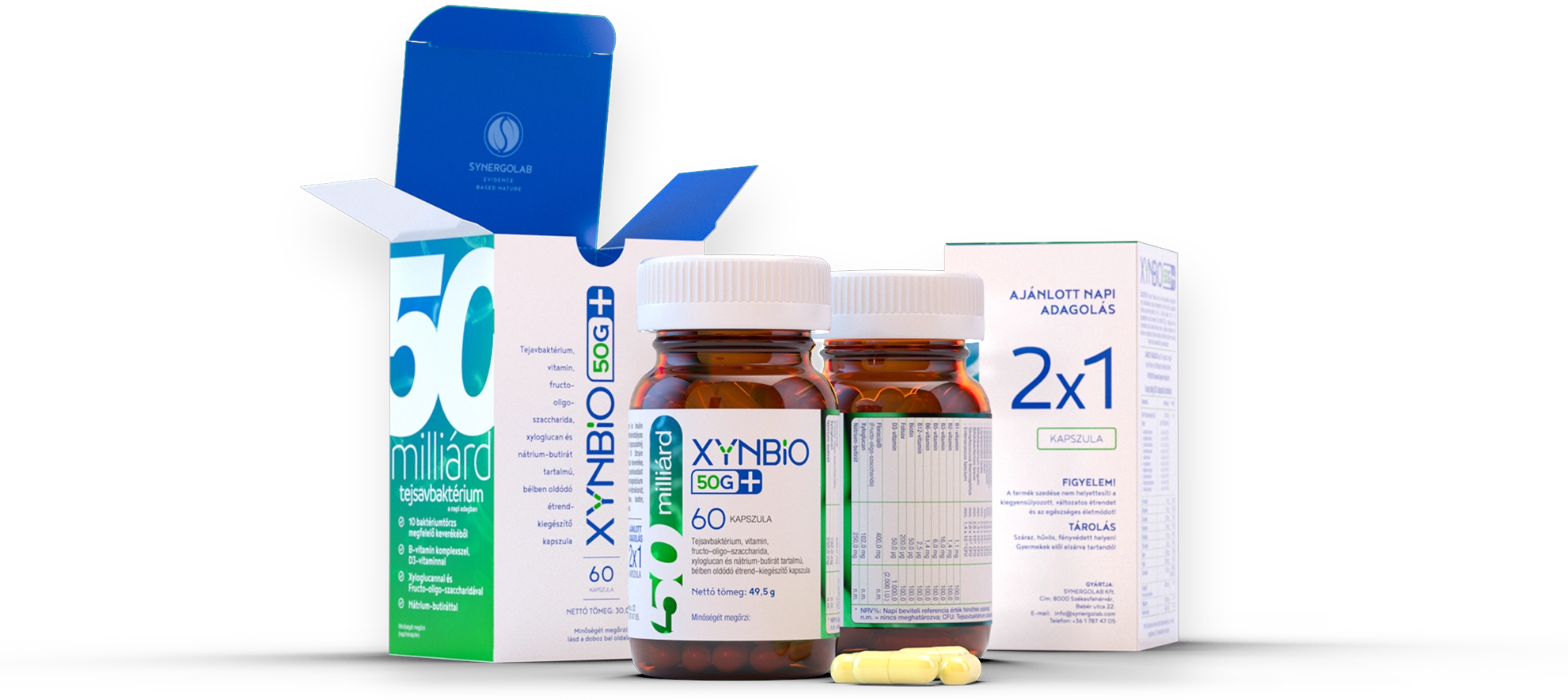
50.000.000.000 (ötven milliárd) tejsavbaktérium a napi adagban!

A szervezet egyensúlyának megtartásában fontos szerepe van a bélflórának.
A mikrobiom életkor
szerinti eltérései
A velünk élő
baktériumok száma
és összetétele
folyamatosan változik
életünk során.
Bélflóra
és étrend kapcsolata
Az egyes bélbaktérium
fajok és az étrend
között szoros
összefüggés
mutatható ki.
A mikrobiom földrajzi változatossága
A bélflóra összetétele
nagymértékű
változatosságot mutat
földrajzi területek
összehasonlításában.
A normál bélflóra jelentősége nehezen túlértékelhető
a klinikai gyakorlatban.

A klinikus orvos szemüvegén át terveztük a biztonságos
és folyamatos alkalmazhatóságért.

10 válogatott baktériumtörzs, élesztőgombával, nátrium-butiráttal,
Floracia™-val és xyiloglükánnal kombinálva.
Multilingual packaging
A Xynbio™ 50G+ speciális, bélben oldódó kapszulában kerülgyártásra a megfelelő, célzott hatóanyag leadás érdekében.

Összetevők
a továbbiakban részletes információkat olvashat a Xynbio™ 50G+ összetevőiről:

Tejsavbaktériumok
A Xynbio™ 50G+ napi adagja 50 milliárd tejsavbaktériumot tartalmaz 10 válogatott baktériumfajból.
A tejsavbaktérium név nem rendszertani kategória, hanem közös anyagcsere és élettani sajátosságokkal rendelkező baktériumcsoportok gyűjtőneve. Ezen heterotróf baktériumok közé tartozó mikroorganizmusok közös jellemzője, hogy kizárólag tejsavas erjedéssel történő energianyerésre kepések.
Nincs a baktériumoknak még egy olyan csoportja, amely az emberrel olyan sokoldalú viszonyban állna, mint a tejsavbaktériumok.
1. Lactobacillus plantarum LP 28
2. Bifidobacterium animalis subsp. lactis BAL06
3. Lactobacillus fermentum LF26
4. Lactobacillus paracasei LPC12
5. Lactobacillus rhamnosus LRH10
6. Lactobacillus rhamnosus LRH113
7. Bifidobacterium longum BL986
8. Lactobacillus acidophilus LA1063
9. Lactobacillus helveticus LH43
10. Streptocossus thermophilus ST30
xyloglükán
A normál bélflóra fontos szerepet tölt be a bélfal barrier funkciójának fenntartásában.
A bélfal csökkent integritását a vele járó permeabilitásfokozódás miatt „lyukas bél” (leaky gut) szindrómának nevezik, amely a következményes krónikus, alacsony szintű gyulladás kialakulásával sokak szerint melegágya a civilizációs betegségek hosszú sorának (szisztémás és degeneratív megbetegedések, autoimmun zavarok, allergiás kórképek, elhízás, zsírmáj, 2-es típusú diabétesz). A bélfalat nyálka, (mucin) borítja be, amely megóvja a bélfelszín sejtrétegét a kiszáradástól, a mechanikai és kémiai ártalmaktól, illetve a kórokozóktól.
A Xynbio™ 50G+ -ban a tamarind fa terméséből kivont xyloglükánt alkalmaztuk, mely tudományos folyóiratok beszámolói szerint, mucin szerű védő filmréteget képezhet a nyálkahártya sejtjeinek felületén. A közölt vizsgálati adatok alapján nagy mértékben lehet képes csökkenteni, hogy a károsító anyagok, a megnövekedett permeabilitás miat, közvetlen kapcsolatba kerüljenek a bélhámsejtekkel, ezáltal segíthet megőrizni a szoros sejtkapcsoló struktúrák (tight junction) működését.1
1 Núria Piqué et al. Xyloglucan, a Plant Polymer with Barrier Protective Properties over the Mucous Membranes: An Overview . J. Mol. Sci. 2018, 19, 673; doi:10.3390/ijms19030673
nátrium butirát
A szervezetet kolonizáló baktériumok az életciklusuk során különféle anyagokat termelnek, illetve választanak el.
Ezeket a vízoldékony faktorokat, amik között mikrobiális anyagcseretermékek, illetve mikrobiális sejtalkotók is vannak, együttesen posztbiotikumoknak nevezik.1
Az elmúlt évtized kutatásai ráirányították a figyelmet arra, hogy ezek a bakteriális anyagcseretermékek és lizátumok mennyire fontosak mind a mikrobiomon belüli kommunikációban, mind pedig a baktériumok gazdaszervezettel való kommunikációjában.
Az emészthetetlen növényi rostok vastagbélben történő bakteriális fermentációja során felszabaduló rövid szénláncú zsírsavak (SCFAs) legfontosabb és legtöbbet tanulmányozott fajtája a nátrium-butirát.1
1 Aguilar-Toalá JE, Garcia-Valera R, Garcia HS, Mata-Haro V, Gonzalez-Córdova AF, Vallejo-Cordoba B. et al. Postbiotics: An evolving term within functional foods field. Trends Food Sci Technol. 75;104−114, 2018
Floracia™
A Floracia™ újgenerációs, kettős összetételű készítmény, mely frukto-oligiszaharidokat és akácrost-poliszaharidokat tartalmaz.1
A frukto-oligoszaharidok fruktóz monomerből felépülő oligoszaharidok, melyek a természetben legnagyobb mennyiségben polimerként inulin formájában vannak jelen. Az inulin a növényvilág egyik elterjedt poliszacharidja. Az inulin az emberi emésztőtraktusban nem abszorbeálódik, valamint a megfelelő inulináz enzim hiánya miatt nem is bomlik le. Ezáltal az emberi táplálkozásban ballasztanyagként szerepel, és csupán a vastagbélben kepések a baktériumok az inulint bontani. A frukto-oligoszacharidok a vastagbél szakaszát elérve az ott jelen lévő bifidogén baktériumoknak szénforrásként, tápanyagként szolgálnak, amelyet laktáttá, rövid szénláncú zsírsavakká (acetát, propionát, butirát), és gázzá alakítanak, hasonlóan más diétás rostokhoz.2 Az elmúlt években számos kutatást folytattak az inulin és a frukto-oligoszacharidok táplálkozás-élettani hatásainak feltérképezésére, pontos megismerésére.3,4
A frukto-oligoszacharid gyorsan fermentálódik a felszálló vastagbélben. Az akácrost-poliszacharidok lassabban erjednek, nagy molekulatömegük és erősen elágazó, összetett szerkezetük miatt. A frukto-oligoszacharidok és az Akácrost-poliszacharidok speciális kombinációja nagyobb hatást eredményez, mint a külön-külön alkalmazott frukto-oligoszacharid vagy Akácrost.5
1 NEXIRA data on file - www.nexira.com • France (Headquarters) +33 2 32 831818
2 Bornet és mtsai., 2002
3Halmos, T., Suba, I. [Physiological patterns of intestinal microbiota. The role of dysbacteriosis in obesity, insulin resistance, diabe es and metabolic
syndrome]. Orv. Hetil., 2016, 157(1), 13–22.
4 Rao, 2001; Roberfroid, 2000, 2002; Biedrzycka és Bielecka, 2004; Van de Wiele és mtsai., 2004; Macfarlane és mtsai., 2006).
5NEXIRA data on file - www.nexira.com • France (Headquarters) +33 2 32 831818
D3-Vitamin
AXynbio™ 50G+ 2000 nemzetközi egység D3-vitamint (kolekalciferol) tartalmaz.
Az aktivált D-vitamin valójában szteroidhormon, amelynek receptora szinte minden sejten kimutatható. Meglepő, de a D-vitaminhiány az egyik leggyakoribb hiányállapot a fejlett világban.
Egyre több vizsgálat bizonyítja a D-vitaminpótlás és kezelés a jól ismert csonthatásokon kívüli előnyös hatásait is. Így ma már igazolást nyert, hogy hozzájárul az immunrendszer normál működéséhez, és szerepet játszik a sejtosztódásban is.EFSA
A Xynbio™ 50G+ teljesértékű B-vitamin
komplexet tartalmaz.
DR Caps™ Bizonyított, célzott hatóanyagleadás
savérzékeny összetevők esetén.
A Xynbio™ 50G+ a SynergoLAB bejegyzett védjegye.
Copyright © 2025 SynergoLAB Inc. Minden jog fenntartva.
*A feltüntetett termékképek illusztrációk,
a termékek megjelenése ettől eltérhet.